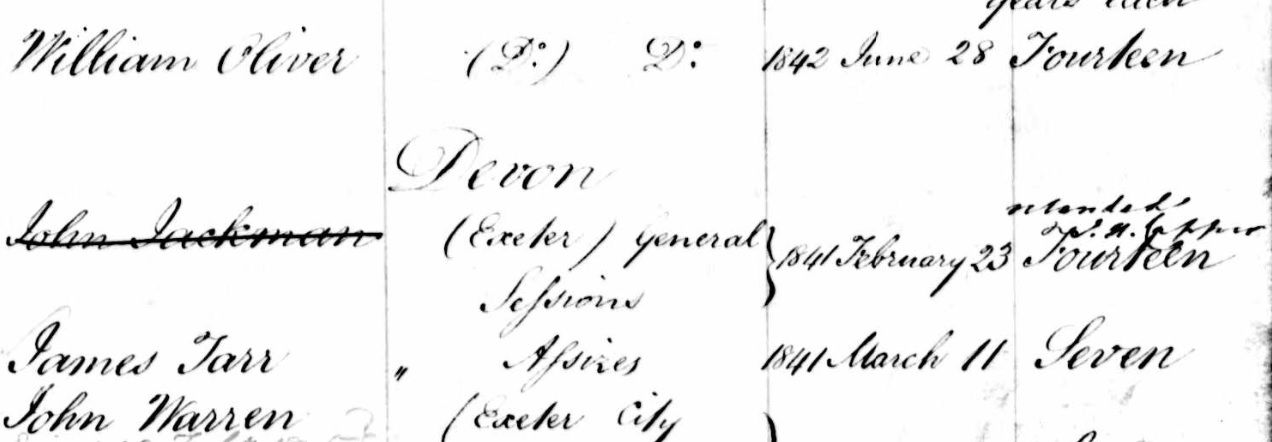John Jackman
On 23 February 1841, at Devon County Sessions Thomas Laskey of Exeter aged 23 was charged before John Sillifant JP with stealing two months previously, ten pecks (a large sack) of wheat from John Hooper, a farmer at Chagford. He had been remanded in jail, and was tried alongside John Jackman, of St Sidwell’s Exeter, who had been bailed and was accused of receiving the stolen goods.
Jackman had been born in Spreyton and baptized there in 1808. The family then moved to Colebrooke. In Exeter in 1834 he married Betsey Shopland of Bridestowe . (Betsey was Hugh T Shopland's father's half-sister.)
Jackman was said to have a reputation as an honest and industrious man, who earned a good living as a “regrater” (or middle man) dealing in potatoes and other provisions. However the regraters of Exeter had recently been in trouble over a potato price fixing scandal.
Hooper stated that he had seen his waggon loaded with barley to be taken to Exeter, but after it had left he realised he was missing one of the six sacks of wheat in his barn.
Laskey, when he got to Exeter, tried to sell the sack (which he thought contained barley) to the brewer at the Ship Inn in Alphington Street. The brewer didn’t want it, so Laskey told the court that he then arranged for Jackman to collect the sack of wheat, which he carted away in a wheel barrow. Jackman gave him 12 shillings, and then sold the wheat for a pound to James Upright, a mill owner.
Laskey was eventually arrested in Plymouth, where he had enlisted in the Royal Marines under a false name. He confessed his part in the crime, and implicated Jackman. Jackman’s story was that he had bought the wheat off another farmer.
They were both found guilty. Despite both having good character references, Laskey was sent to bridewell for six months; then Sillifant (from Coombe House at Colebrooke) sentenced Jackman to 14 years’ transportation. He said that this pained him very much, as he had known Jackman from when he was a boy.
This came as a shock for Jackman, who expected to be found innocent. At that time he was living in St Sidwell’s Exeter with his wife Betsey and children Samuel, 4 and Ellen, 2. He was sent down to the prison hulk “Stirling Castle” moored at Devonport.
Betsey and the two children had no money coming in. They were now a burden to St Sidwell's parish. Betsey and her widowed mother-in-law Ann Jackman aged 75 were examined in front of a magistrate.
Betsey explained that she was born in Bridestowe. Prior to her marriage she had been in service in Colebrooke where her future husband had been working at Crispins, a small farm that his parents had previously rented for 25 years. For two years John had been paying rent of £10 per year, and taxes. The landlord was "Mr Norris" who lived at Colebrooke (probably Samuel Norrish of Horwell).
John and Betsy had married in Holy Trinity, Exeter in November 1834, then lived in a room on Exe Island, before moving to St Thomas for nine months. In Christmas 1836 he rented a small house in St Sidwell’s, No 4 Gattey’s Court off Mr Johns for £9 a year, until Lady Day 1841 when, consequent on her husband being transported, she had to give up her house. At that time she and her two children became chargeable to St Sidwells. The magistrate decided she should be removed to Colebrooke.
Ann Jackman, who was a pauper in receipt of parochial relief in Colebrooke, confirmed Betsey's story.
So Betsey and the children were "removed" to Colebrooke.
On 14th August 1842, John was prepared to transfer from the prison hulk to sail on “Moffatt” to Van Diemen’s Land. His name is among the ship's list of convicts being transported, but is crossed out with a note which appears to read “relanded JH Capper”. John Henry Capper was an official in the Home Office.

Someone had presumably been lobbying on his behalf and he won a last-minute reprieve. I suspect that Sillifant and Norrish were behind this, after Betsey and the children had become a financial burden on Colebrooke parish.
Ironically Thomas Laskey, who stole the sack of wheat, was later found guilty of highway robbery in July 1842, and was transported to Tasmania. Jackman was kept on board the hulks until 1846, when he received a free pardon and was released.
By 1851 the Jackmans are back together again, living in Russell Street in St Sidwell’s Exeter, where John is a dairyman.
One night in February 1855, his cow house burnt down. The building housed seven dairy cows, two calves, and a horse, all of which died, besides hay and other property which was destroyed, estimated to be worth £150. He was insured to a value of £100. Arson was suspected.
They seem to have then left Exeter. It is probable that they all emigrated to the Scranton area of Pennsylvania, USA, in about 1856. Certainly several of his wife’s relations, the Shoplands of Bridestowe, had already made their home there.
